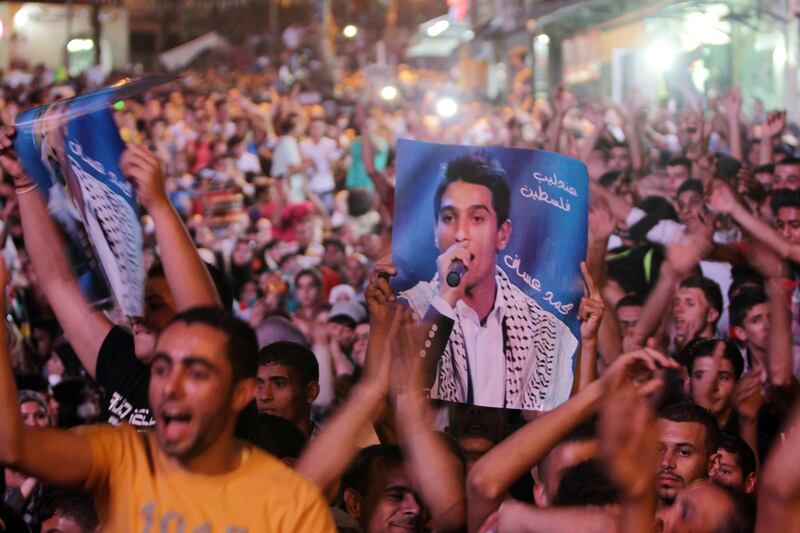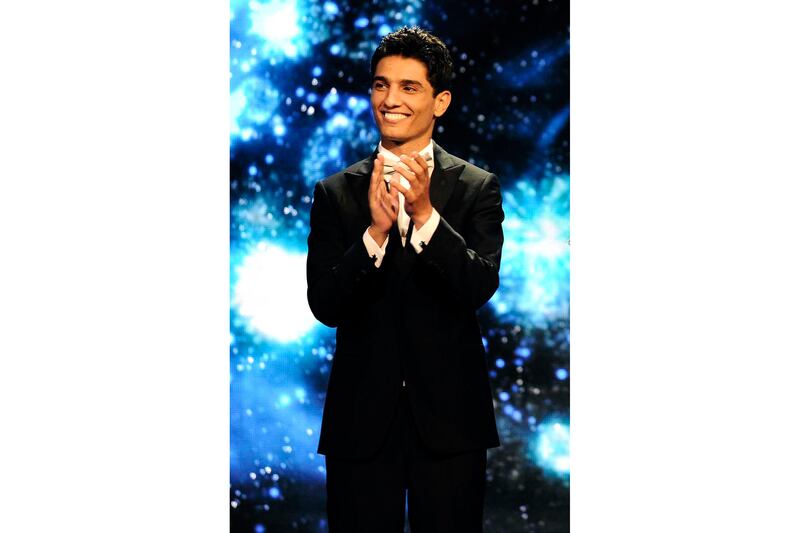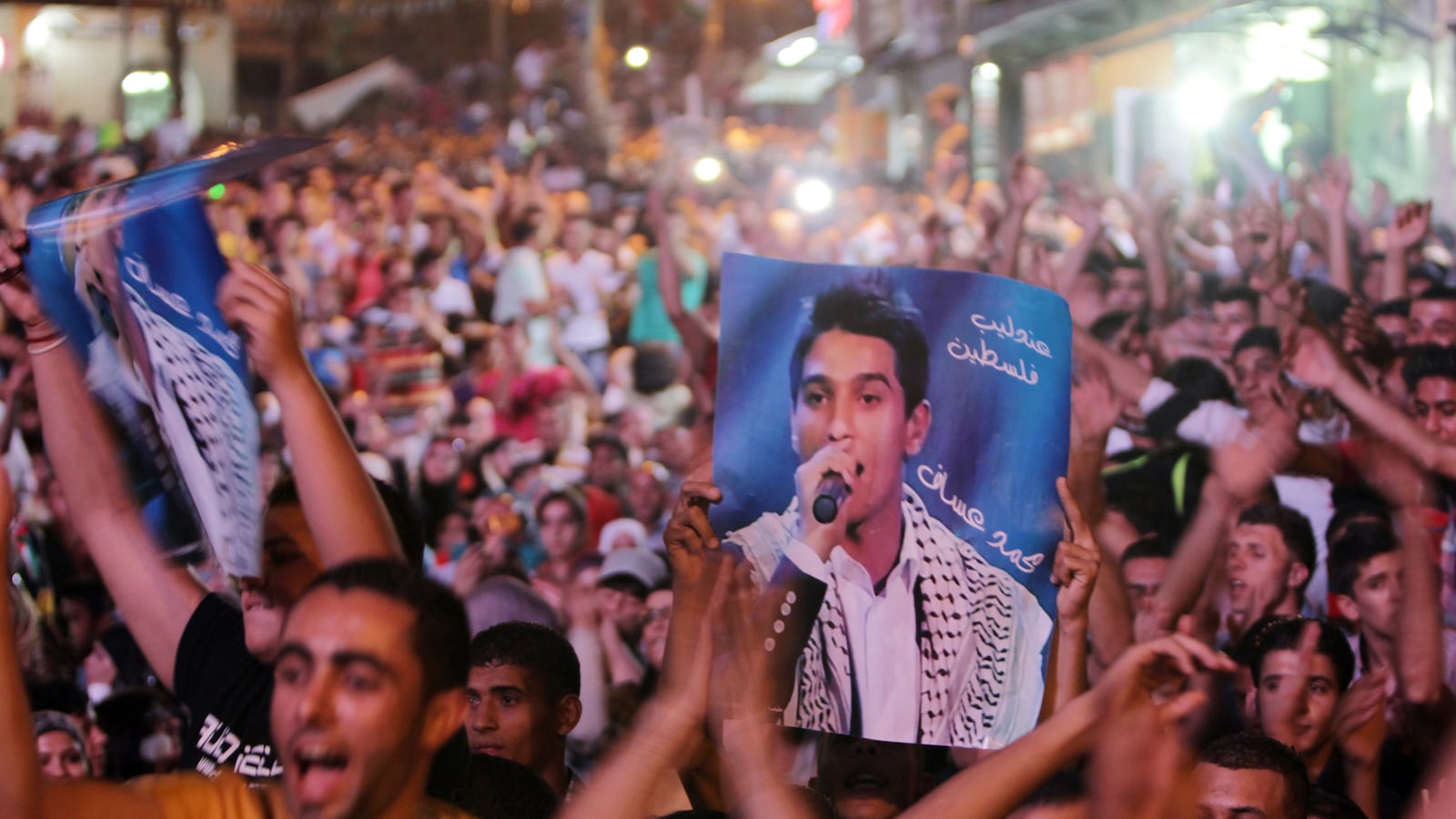It was a sight to behold: tens of thousands of Palestinians singing and dancing in the streets of Gaza and the West Bank. Not since the United Nations voted to recognize a Palestinian state last year did these two splintered factions come together as one—and even then, it didn’t look like this. A sea of people gripped by ecstasy, hugging and kissing under a sky lit up by fireworks. The reason for this rare moment? A young man named Mohammad Assaf.

On Friday, Assaf, a handsome 23-year-old from Gaza, became an international superstar when, against all odds, he won the second season of Arab Idol. The show, which airs on MBC (the Middle East Broadcasting Corporation), is the most popular television show in the Arab world right now, with an estimated 100 million viewers in 21 countries. (Think American Idol seasons one through five, only about a gazillion times bigger.) Assaf, the second person to win the show, is nearly as big as the Beatles, before Yoko. But the enormity of it all hasn’t sunk in yet.
“I thought I had talent,” said Assaf from his hotel room in Gaza, “but I was very surprised to see how many people appreciated me.”
His rise from underdog status to winner hasn’t just excited Palestinian Idol fans—it has united Arabs all over the Middle East, and earned him some unexpected fans. Within hours of his return to Gaza, UNRWA, The United Nations Relief and Works Agency, which helps Palestinian refugees, appointed him “goodwill ambassador.” So did Palestinian President Mahmud Abbas. The Palestinian government even issued him a diplomatic passport. He has traveled from Beirut to Cairo to Gaza, surrounded by a team of producers, security guards, assistants, and diplomats. At every stop, he was greeted by swarms of paparazzi that would make Kim Kardashian envious.
“It’s been unbelievable!” said Assaf. “You can’t imagine how many people have come to say hello to me and shake my hand.”
He may be a reality-show winner, but in a place desperate for good news, Assaf has become a bona fide hero.
“He’s a patriot,” said Majdi Esleem, a 27-year old freelance writer from Gaza City. “He is part of the people and his message is that of peace.”
Assaf’s popularity goes way beyond the Green Line. “He put Palestine on the map,” said Shadi Srour, a TV director from Nazareth, the largest Arab city in Israel. “There is not a single person in the Arab world who doesn’t know who he is.”
Assaf’s road to victory on Arab Idol sounds more like a Mexican telenovela than a Middle-Eastern reality show. He was born in Libya to Palestinian parents who returned to Gaza when Assaf was a little boy. There, they lived in a refugee camp under deplorable conditions. To help make ends meet, little Assaf would sing at weddings and events. He tried his luck in a Palestinian singing show but didn’t get very far. When the auditions for Arab Idol began in Cairo, Assaf begged Hamas, which controls Gaza, to let him travel to Egypt. They weren’t crazy about the inclusion of female contestants wearing glamorous gowns and glossy lipstick. He finally got permission to leave, but when he arrived in Cairo two days later, he was crushed. Along with thousands of other disappointed hopefuls, Assaf was locked out of the hotel where the auditions were taking place. So many people showed up, producers weren’t accepting any more applicants. Desperate, Assaf jumped over the wall surrounding the premises only to be caught by the guards.

Assaf appealed to their sense of compassion. “I need this opportunity,” he pleaded, “I have a good voice and I have talent. Please let me in!”
The guards took pity on him. But when he walked into the hotel, he realized there was one more problem: he didn’t have a number to audition. Not willing to go home empty-handed, Assaf did something ballsy: he opened his mouth and started singing… right there in the middle of the lobby. His voice caught the attention of everyone around him, including one fellow Palestinian, to whom Assaf will forever be indebted.
“He came up to me and told me, ‘You have a much better voice than mine. Take my spot because I’m sure if you get in, you’ll succeed.’”
And succeed he did. Assaf made it onto the show and soon charmed everyone. He had an incredible voice, he was easy on the eyes, and he had a story that would make Cinderella weep. Soon, it was all anyone in the Arab world could talk about. At home he was nothing short of a national obsession. His face was plastered all over walls and billboards across Gaza and the West Bank. Local cell phone companies announced they would sponsor the cost of his votes. Even then-prime minister Salam Fayyad campaigned for him on his Facebook page.
As the lights dimmed during the finale, he stood along two other favorites: Ahmed Jamal, an Egyptian, and Farah Youssef, a Syrian. But when the confetti dropped it was Assaf who stood in disbelief, his life forever changed.
“It was a real shock,” said Assaf. “Suddenly I was the Arab Idol! That was really something big.”
His win wasn’t without controversy. Religious leaders in East Jerusalem criticized the show, with one even calling it a “sin.”
Assaf’s acceptance speech was equally contentious. Moments after his triumph, Assaf dedicated his win to the “shahids,” a term which means martyr, and is used to describe suicide bombers, “who were killed while struggling.”
And while those words were like fingernails on a chalkboard to anyone watching in Israel, the speech only made Assaf more popular elsewhere in the Middle East. So popular that Hamas, which at first didn’t approve of the competition, was forced to backtrack, and congratulated him on his win.
His schedule is completely booked these days. He’s already expected in Dubai for a post-Idol performance. To show there are no hard feelings, Assaf is planning a show in Nazareth. And President Abbas has invited him to perform in the West Bank, where he will no doubt be greeted with the fanfare reserved for kings, queens … and pop idols.
“I’m proud to represent the Palestinian people,” said Assaf. “I want to show the world that we have talent and that we can have a dialogue with everyone on earth.”






